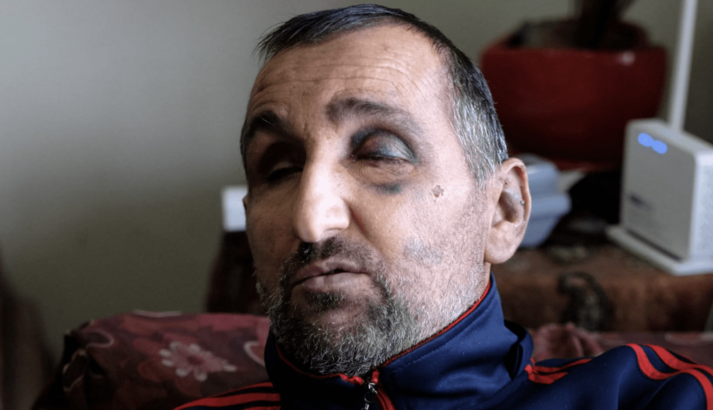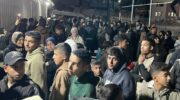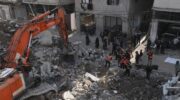Munzer Mizhar at home in the West Bank town of Dawha, near Bethlehem. Credit: Alex Levac
Israeli soldiers break into a home in the middle of the night, severely beat a blind, diabetic man on dialysis as his wife begs them to stop. Later, an Israeli military spokesman’s explanation does not remotely resemble the family’s description of the incident.
by Gideon Levy and Alex Levac, reposted from Ha’aretz
He’s lying on the living room sofa, next to the gas stove, trying to warm his broken body. When we visited him this week, he had just returned from the hospital and was worn out from the dialysis treatment he has been undergoing three times a week for the 11 years since his kidneys stopped functioning, as a consequence of severe diabetes.
Before that, 15 years ago, he started to lose his sight, and for the past few years he has been completely blind. Also, over the course of the last six years, he has gradually had to have toes amputated, operation after operation. His face is sallow from the dialysis.
Physically shattered, he lies there, barely able to move. He needs help getting up; he’s incapable of doing anything on his own. Every few months, he travels to Jordan for the catheterization of the blood vessels in his legs, which are becoming blocked.
So yes, Munzer Mizhar, 47, is a very sick man. Still, last week, that didn’t stop Israeli soldiers from pummeling him mercilessly, even after the neighbors had warned them that he was sick. Nor was his wife, an eyewitness to the attack, able to prevent the abuse of her husband despite her shouts that he was blind, too.
Nothing helped. The fists landed on his face – the blue marks are still visible, particularly below his dead eyes, now blood-red. He also has wounds on his shoulders and both hands – from his attempts to ward off the brutal assault.
It all happened while he was in his bed after 4 A.M. on February 20.
A medical technician, Mizhar was employed in a laboratory belonging to the Palestinian Authority but had to take early retirement because of his deteriorating health. He speaks good English. He and his wife Iman have four sons, the oldest 18 and triplets of 16. Iman, who is 45, has cancer, for which she’s treated at Augusta Victoria Hospital in East Jerusalem, and in Jordan.
Her condition is good. She joined the conversation in their house this week but grew pale as it proceeded and had to lie down several times, eyes closed, tears welling up. The trauma of her husband’s beating is still vivid, painful and hard for her to bear, perhaps even more than for him. Family members say she cowers in fright whenever the horrors of that night are recalled. They live in a well-kept home in the town of Dawha near Bethlehem.
The attack
That Wednesday, Munzer was awakened at about 4:45 A.M. by the sound of footsteps in the house. He woke his wife. He thought that maybe his sons were wandering about in the dark.
His wife opened her eyes and screamed. He didn’t understand what was going on. At first they thought burglars had broken in. But Iman saw shadowy figures who had entered their room, while red laser beams sliced through the darkness toward their bed.
The specters moved without sound. Later it would emerge that the troops had silently broken down the door. After an instant, Iman realized that the intruders were soldiers. They were masked, five or six of them in the bedroom, aiming their rifles at the couple. More troops waited outside.
Iman got out of the bed, her hair exposed to the eyes of the men who had invaded her room – a very sensitive matter for them, which Munzer refers to with pain. One soldier approached the bed and without a word punched Munzer in the face. Munzer is convinced that the assailant wore brass knuckles. His face began to bleed, with a lot of blood streaming from his nose, as well as from the wounds on his hands, which ultimately failed to protect his face. He saw nothing, of course.
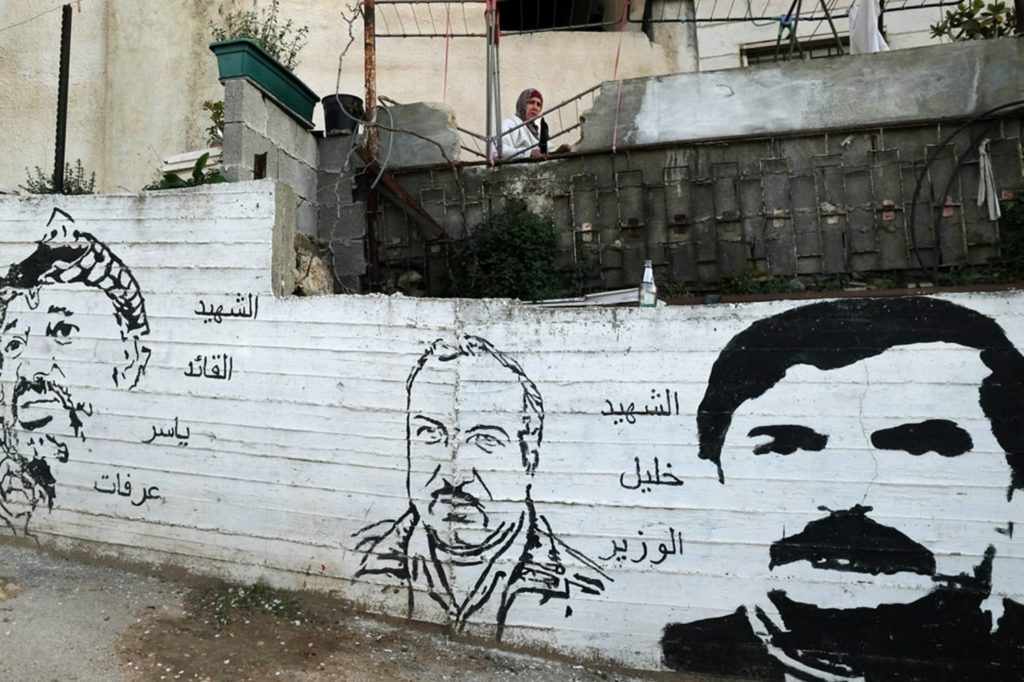
Iman, standing next to the bed, went on shouting, but the soldiers blocked her from defending her husband. She tried to explain that he was blind and sick, but it was useless. Probably none of the soldiers understood Arabic. The soldier held Munzer’s head with one hand and hit him relentlessly with the other, she says. The others just stood there. The beating went on for at least five minutes.
A light in the bathroom scattered a little light into the room. Outside it was still dark, and the soldiers didn’t turn on the lights inside. Maybe that’s why they didn’t notice that the person being abused was helpless, blind and sick. Munzer asked the soldiers who they were. He got no reply. Iman told them she wanted to talk with the officer in charge. No one responded. Finally the blows ceased.
Iman sat Munzer up in the bed. He asked her where the children were. Then she helped him get up and led him toward a chair in the room. At first the soldiers wouldn’t allow Munzer, his face streaked with blood, to sit down. They didn’t ask him to identify himself and didn’t say who they were looking for.
Before this his eldest son, Talal, had awoken and heard his parents shouting that there were burglars in the house. Then, from the doorway, he saw his father bleeding. His brothers also woke up. The soldiers refused to let them enter their parents’ room and ordered them to raise their hands. One of the sons was overcome with dizziness and fell to the floor.
The soldiers were in the house for about 20 minutes. They didn’t search for anything. None of them thought to offer the wounded Munzer medical attention. Munzer says the worst thing is that a blind person doesn’t know when the next blow is coming.
Why did they hit him?
“You don’t know why?” his sister Maysoun, a bitter smile on her lips, asks us. “I’m afraid to talk because you’re Jews. They beat us all. The occupation beats us all. We are under occupation. This isn’t the first time they beat someone for no reason, and it’s not the last. What’s new about it is that this time they beat a blind person.”
One of the boys suggests a different explanation: Maybe they struck his father because he has a beard? True, not a full beard, but still a small beard that raises suspicion.
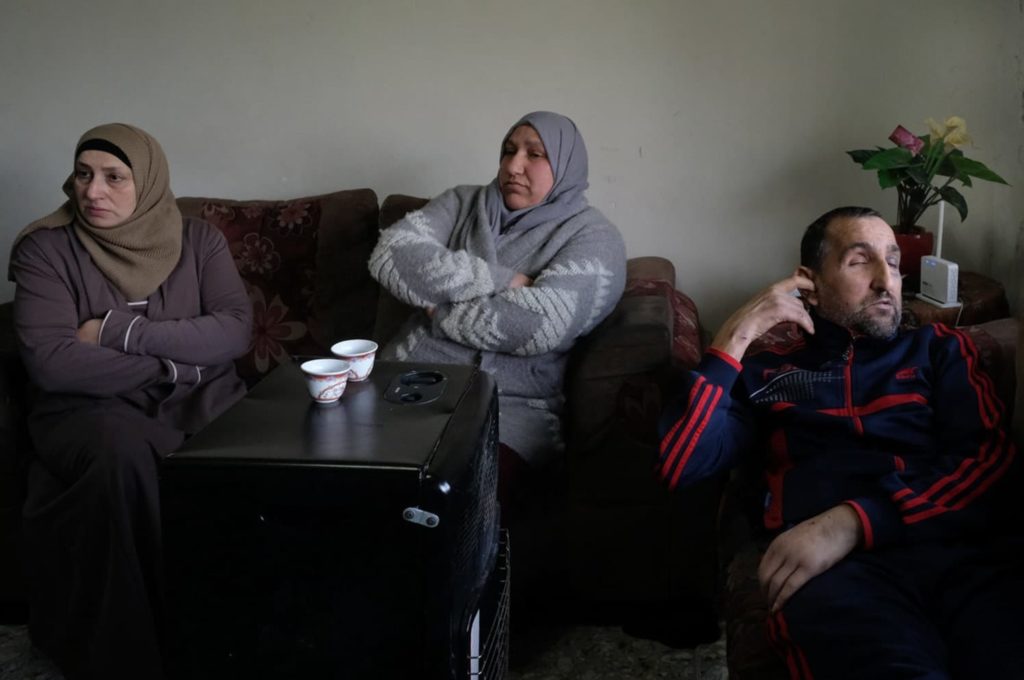
Maysoun is concerned that now her brother won’t be allowed to travel to Jordan in June for his regular medical treatments. We tried to reassure her – after all, he didn’t do anything.
In any case, back on that Wednesday morning, the soldiers ordered the four boys to get on their knees, faces pressed to the floor, and not to move. Then they left the house.
Munzer was taken to Hussein Hospital in Beit Jala. Since the event, he has suffered from pains in his jaw and has difficulty eating solid food. To see him lying on the sofa totally helpless, trying to find a comfortable position, the remnants of his feet bandaged, occasionally closing his eyes, is to understand what the soldiers wrought.
Looking for someone else
The next day the family learned that the soldiers had been looking for Fadi Hilweh, 20, who’s wanted by the army and the Shin Bet security service, though it’s not clear why. He lives on the floor above. The soldiers went there first, and when they didn’t find him, a Shin Bet agent known as “Capt. Nidal” ordered Hilweh’s mother to contact him and have him come home.
In the meantime, the soldiers went downstairs to the Mizhars. The neighbors say that they too warned the soldiers that Munzer was blind and sick, but no one was interested. Munzer wants to know why they didn’t knock on the door instead of invading the house. He would have opened the door and they could have seen for themselves that Hilweh wasn’t there.
Hilweh eventually came home and was arrested. Did the soldiers think that Munzer was the wanted person, so they beat him? Even in the dark, no one could mistake a sick, blind man of 47 for a 20-year-old. “Maybe they thought [the wanted man] was Munzer, and maybe they’re just violent criminals,” Maysoun says. Musa Abu Hashhash, a field researcher for the B’Tselem human rights group, says quietly, “This is the most shocking case I’ve ever documented.”
Official “explanation”
The IDF Spokesman’s Office made the following statement to Haaretz: “During an operation to apprehend a wanted individual in Bethlehem, information was received that the wanted person was inside a particular building, and a search was undertaken there. During the search, a Palestinian woman tried to prevent one of the fighters from reaching a Palestinian man in the room that the fighter wanted to inspect. The fighter tried to check the Palestinian man, who reacted by grabbing at his body and his weapon, and shouted and acted disruptively. The fighter pushed the Palestinian aggressively, trying to get him under control, and as a result the man was injured. At this stage the fighter realized that the man was blind, and was not the wanted person, and tried to calm him down while allowing the man’s wife to attend to him immediately. The incident was investigated and appropriate conclusions were drawn.”
Iman has been in a state of depression and constant fear since that night. The boys ask whether the soldiers will come back. The family has added an extra lock to the front door. Munzer can only focus on his illness and his pain. He wakes up each every night imagining that he hears footsteps in the dark. He’s certain that the soldiers are returning to give him another thrashing.
RELATED READING:
“He can’t breathe”: a Palestinian Eric Garner
Not a person, but a “knife-wielding Palestinian”
WATCH: Yes, Israel does arrest children
Crimes against Humanity: Israeli Snipers have shot down 45 Child Gaza Protesters

